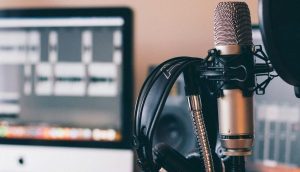What does your brain look like on branded podcasts? A new global study from the BBC finds that the branded audio format might be a strong way to reach the growing number of podcast listeners. The study, titled Audio: Activated, measured second-by-second brain activity to research the brains of audio listeners to gauge the benefits of the space for brands.
Neuroscientists found the language of a podcast can create subconscious associations with a particular brand. Because 94% of podcast listeners tune in while engaging in other activities like doing chores, driving, exercising or shopping, the study found that an occupied brain means the content of a podcast is being absorbed through “low-involvement processing” that is a “fuel-efficient process” with a lower cognitive load so engagement lasts longer.
So, what does that mean for non-science nerds? Brands are reaching people in what were previously thought of as “unreachable moments.” According to the study, based on the words used in a podcast, listeners are more likely to equate them with the sponsor as well as the host or content, “showing they instinctively associate the brand with the message.”
On average, brand mentions in a podcast create 16% higher engagement and 12% higher memory encoding than the surrounding content. Global radio benchmarks rank brand mentions at around 5%. “The intimate and conversational nature of the podcast environment creates an elevated state of engagement for brand mentions,” the study reads, driving brand metrics 89% in awareness, 57% in brand consideration, 24% in brand favourability and 14% in purchase intent.
According to Edison Research, as of late 2018, roughly 38% of Canadians subscribed to a music streaming service – ad-free – however, nearly the same number, 36% are daily podcast listeners, making podcasts an effective way to reach what the BBC deems “ad avoiders.”
Audio: Activated studied 2,448 people in 10 markets worldwide. Emotional intensity, long-term memory encoding and cognitive engagement were measured using regular podcast listeners in multiple markets who tuned in to the 30-minute finance podcast, Money Movement.























